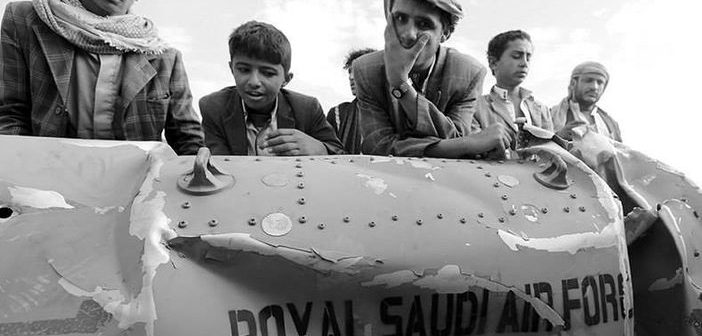Two years have passed since the ongoing civil war erupted in Yemen, triggering wide-scale external military intervention by the Saudi-led Arab coalition that launched the so-called “Decisiveness Storm” operation on March 26th, 2015. Following two years of devastating warfare no reasonable political settlement seems to be realizable. Meanwhile the humanitarian situation is extremely miserable – international organizations repeatedly warned of a looming famine in the war – a ravaged country where some 17 million of the Yemeni people are facing starvation.
However, such alarming figures at the humanitarian level have not yet prompted any serious actions by the international community to push for a political solution to the conflict. It appears that the Yemeni crisis has been further complicated by the regional and international powers’ growing involvement that neutralized the national role that can help producing solutions. As a result, attempts have completely ceased by Yemeni parties to produce a negotiated solution.
It was in April 2016 when the Yemeni negotiators sat together for the last time in Kuwait. After that several initiatives by international parties aimed to help, but no progress was realized.
United States’ role
The new U.S. Republican administration headed by Donald Trump has produced significant change in the American attitude about the Yemeni crisis.
The Democrat administration under President Obama approached the Yemeni crisis in view of the American-Iranian rapprochement under the Iranian nuclear agreement. That was clearly evidenced by the U.S. former Secretary of State’s initiative, in which he offered Al-Houthis rebellious movement, backed by Iran, a significant role in the power. His proposal even didn’t honor the international resolutions about the Yemeni conflict including the UN Security Council resolution 2216.
Apparently, the American policy about the Yemeni predicament has significantly changed now. The Republican administration is going to act differently, considering the Iranian influence expansion as a threat to its allies’ interests in the region, mainly Saudi Arabia and other Gulf States.
For this reason, the Trump Administration’s position seems to be more identical to that of Saudi Arabia, particularly following the visit by the Saudi-Deputy Crown Prince to Washington.
Iranian role
The Iranian role is increasingly and plainly growing in the Yemeni crisis, not only through the media and financial support, but also with military assistance as Iran’s regime has continued to provide the Al-Houthi group with weapons and military experts.
Iranian weapons are frequently reported to have been sent to the group via smugglers. The Iranian leadership has cleverly capitalized on the war in Yemen to increase the Iranian influence and further enhance Iran’s negotiating position over other regional issues including the Syrian file and Hezbollah in Lebanon.
The Iranian regime has taken the advantage of the war in Yemen to gain hearts and minds among a large portion of Arab and Muslims people.
The leader of Al-Houthis group, Abdullmalik Al-Houthi openly defended Iran. In his last speech to his supporters, Al-Houthi highly praised the Iranian’s policy, describing the Islamic Republic of Iran as a defender of Muslims’ interests against the American-Israeli domination schemes, as he said.
Saudi Arabia’s role
Saudi-Arabia leadership is fully aware that Al-Houthis rebels can pose an existential threat to the Saudi kingdom in case that they take control over Yemen with Iran’s support.
For this reason, the Saudi government has devoted large resources and capacities to support the Yemeni national army and legitimate government headed by President Abd Rabo Mansour Hadi. Recently the Yemeni government troops backed by the Arab coalition forces have managed to make remarkable progress on the ground, driving Al-Houthis militants and troops loyal to ex-president Ali Saleh out of large swathes of land. The most important advancement made by the legitimate government troops and the Arab coalition is the control over the Sea port city of Mocha on the Red Sea. The national army recently managed to push the rebel fighters out of the significant harbor that enjoys a very important strategic location nearby the Bab Al-Mandab Strait, one of the most important waterways and marine trade routes in the world.
Saudi Arabia’s warfare with Al-Houthis and their Iranian backers has become an open battle and confrontation on the ground and in the media. Saudi Arabia has come under missile attacks fired by Al-Houthis and Saleh forces. One of the missiles reached territories near the Holy City of Mecca. The Saudi government blamed Al-Houthis and their supporters, referring to the Iranians, for that attack. Such hostile actions will never be tolerated by the Saudis.
Gloomy prospects
There is no indication suggesting that a decisive military victory can be realized soon by any one of the parties to the conflict.
Consequently, the conflict is going to continue, creating more troubles and ordeals for the Yemeni people who can no longer afford any difficulties. Besides that, there will be an intensive regional involvement and more severe conflicts among all parties.
Meanwhile Yemenis seem as if they are powerless, unable to offer or impose any national solution out of the regional and international interferences.



